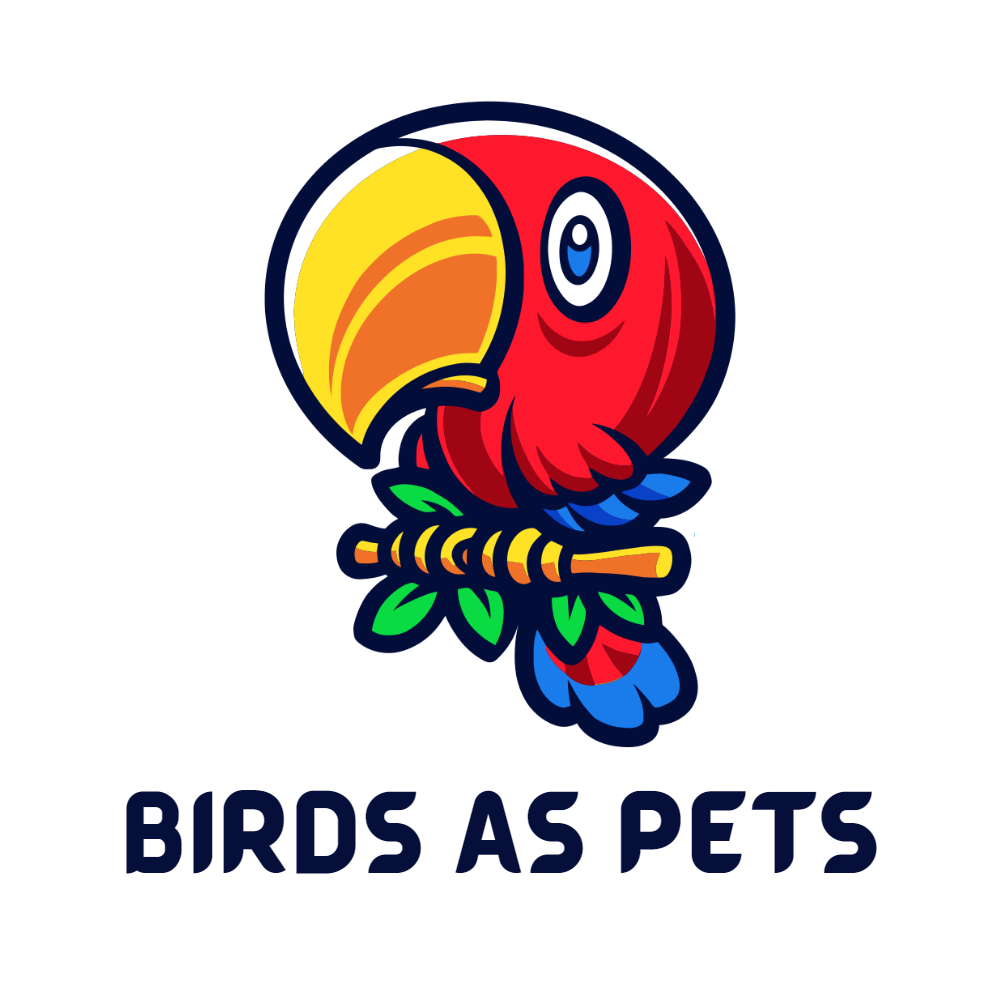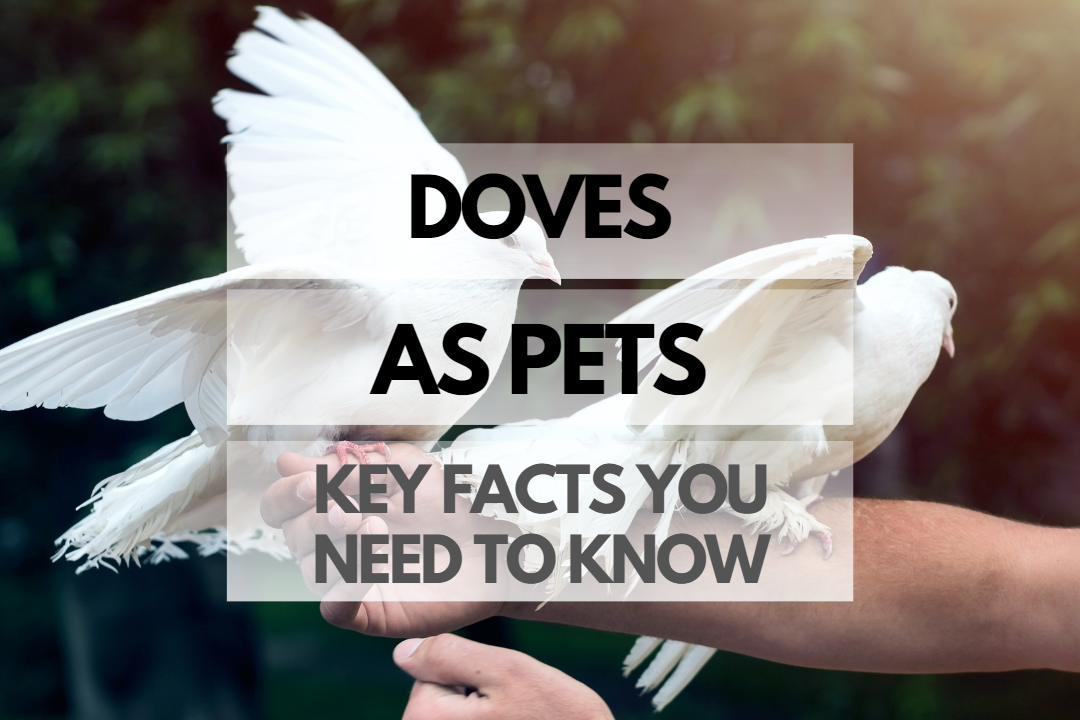When it comes to choosing a pet bird, doves are an often-overlooked option. However, these gentle and charming birds can make wonderful companions for those looking for an easygoing and low-maintenance pet. In this article, we’ll explore everything you need to know about keeping doves as pets, including their lifespan, care requirements, and costs.
Quick Reference Table: Dove Facts
| Fact | Description |
|---|---|
| Average Lifespan | 10-15 years |
| Size | 7-12 inches (18-30 cm) in length |
| Weight | 4-9 ounces (100-250 grams) |
| Color Varieties | White, gray, brown, and combinations |
| Noises | Gentle cooing |
| Temperament | Peaceful, gentle, and social |
| Cage Size | At least 24 x 18 x 18 inches (61 x 46 x 46 cm) |
Where Do Wild Doves Live?
Wild doves are found throughout the world, inhabiting diverse environments such as forests, grasslands, and urban areas. Some well-known species include the Mourning Dove, native to North America, and the Eurasian Collared Dove, found in Europe and Asia.
Dove Lifespan: How Long Do They Live as Pets?
Doves can live for 10-15 years or more with proper care, making them a long-term pet commitment. Providing a balanced diet, a clean and comfortable living environment, and regular veterinary check-ups can help ensure your dove lives a long and healthy life. As a dove owner, it’s essential to be prepared for the time and financial commitment involved in keeping a pet bird.
Are Doves Good Pets?
Doves make excellent pets for people who appreciate their gentle nature and soothing cooing sounds. They are social birds that can form strong bonds with their owners and enjoy spending time with their human companions. Doves are generally low-maintenance, easy to care for, and well-suited to living in smaller spaces, making them a great choice for first-time bird owners or those with limited room for a larger bird.
Are Doves as Pets Good for Beginners?
Yes, doves are an excellent choice for beginner pet bird owners. Their gentle and social nature, combined with their relatively low-maintenance care requirements, make them a suitable option for those new to keeping birds. Doves are also less noisy and demanding than some other bird species, making them a good fit for people who want a more laid-back pet bird experience.
Are Doves Easy to Care For?
Doves are relatively easy to care for compared to some other pet bird species. They have simple dietary needs, requiring a balanced seed mix and occasional fruits and vegetables. Doves are also less prone to destructive behaviors, such as chewing or feather plucking, and their modest size makes housing them more manageable. Regular cleaning of their cage and monitoring their health are essential aspects of dove care, but overall, they are a low-maintenance pet.
Dove Pros and Cons
| Pros | Cons |
|---|---|
| Gentle and social nature | Long-term commitment (10-15 years) |
| Easy to care for | May require a companion if not given enough attention |
| Minimal noise | Not as interactive as some other pet bird species |
| Suitable for smaller living spaces | Limited talking and mimicry abilities |
Dove Price and Costs
The priceof a dove can range from $20 to $100, depending on the species and where you purchase the bird. Initial setup costs for a cage, perches, toys, and feeding supplies can range from $100 to $300. Ongoing expenses include food, bedding, and routine veterinary care, which can cost around $20 to $50 per month.
Where to Buy Doves
You can buy doves from reputable breeders, pet stores, or bird rescues. It’s essential to research potential sources to ensure the birds have been raised in a healthy and ethical environment. Adopting a dove from a rescue organization can also be a rewarding experience, providing a loving home to a bird in need.
Caring for Doves
Dove Food
A diet consisting of a high-quality dove seed or pellet mix, supplemented with fresh fruits and vegetables, is essential for your dove’s health. Offer a small amount of fresh greens, such as spinach or kale, and chopped fruits, like apple and berries, a few times per week. Fresh water should be provided daily, and food dishes should be cleaned regularly to prevent spoilage and bacterial growth.
Health and Common Issues
Doves are relatively hardy birds, but they can still be susceptible to health issues. Some common health problems include respiratory infections, parasites, and egg-binding in females. Regular veterinary check-ups and monitoring your dove’s behavior, weight, and droppings can help you catch any potential issues early and ensure your pet’s well-being.
Signs of Healthy Dove vs. Sick Dove
| Healthy Dove | Sick Dove |
|---|---|
| Bright and alert | Lethargic or unresponsive |
| Smooth and well-groomed feathers | Ruffled or plucked feathers |
| Clear and bright eyes | Discharge or swelling around the eyes |
| Normal weight and appetite | Weight loss or decreased appetite |
| Regular and healthy droppings | Abnormal droppings (color, consistency, or frequency) |
With their gentle temperament, soothing sounds, and low-maintenance care requirements, doves can be a delightful addition to your family. By understanding their needs and providing a loving and supportive environment, you can enjoy a rewarding and long-lasting relationship with your pet dove.
Dove Pet Insurance
While pet insurance is more commonly associated with cats and dogs, it’s worth considering for your dove as well. Some insurance companies offer coverage for exotic pets, including birds. Pet insurance can help cover the costs of unexpected veterinary expenses, such as accidents or illnesses, ensuring that your dove receives the best possible care without causing financial strain. Be sure to research various pet insurance providers and policies to find the best coverage for your dove’s specific needs.
Personality and Behavior
Doves are known for their gentle, peaceful, and affectionate personalities. They enjoy spending time with their human companions and can form strong bonds with their owners. Doves are generally less demanding and easier to manage than some other pet bird species, making them a great choice for first-time bird owners or those with limited space. They are not known for their talking or mimicry abilities, but their soothing cooing sounds can be a relaxing presence in your home.
Are Doves Social?
Yes, doves are social birds that thrive on companionship. They enjoy interacting with their human family members and can become quite attached to their owners. In some cases, a single dove may become lonely if not given enough attention, so it’s important to spend quality time with your pet every day. If you’re unable to provide adequate socialization, you may consider adopting a pair of doves to keep each other company.
Speech and Noise of Doves
Doves are not known for their talking abilities or mimicry skills, but they do produce a soothing cooing sound that many people find enjoyable. Their gentle vocalizations are not overly loud or disruptive, making them a good choice for those who prefer a quieter pet bird. However, if you’re looking for a bird with advanced talking capabilities, a dove might not be the best fit for you.
Similar Species to Doves
There are many species of doves and pigeons, all belonging to the same bird family, Columbidae. Some common species that are kept as pets include the Ring-necked Dove, the Diamond Dove, and the Mourning Dove. Other related species include pigeons, which share similar characteristics and care requirements as doves. If you’re interested in owning a dove or a pigeon as a pet, research the various species to find the one that best suits your preferences and lifestyle.
Can Doves Live With Other Pets and Birds?
Due to their gentle nature, doves can sometimes coexist peacefully with other small, non-aggressive bird species. However, it’s important to carefully monitor their interactions and ensure that they get along well without any signs of aggression or stress. Doves should not be housed with larger or more aggressive birds, as they may become injured or stressed. As for other pets, such as cats or dogs, always supervise their interactions with your dove to ensure their safety.
Are Doves Legal to Have as Pets?
In most regions, it is legal to keep doves as pets. However, it’s essential to check your local laws and regulations to ensure that it’s permissible to keep doves in your area. Some locations may have restrictions on specific dove species or require permits for keeping pet birds. Always do your due diligence to ensure that you’re in compliance with local ordinances.
Additional Resources
- Dove and Pigeon Enthusiasts Facebook Group
- Palomacy Pigeon & Dove Adoptions
- The Complete Pigeon and Dove Reference by James Blake
- Scientific Article: The Behaviour of Doves
FAQ for Doves as Pets
Do Doves talk?
No, doves are not known for their talking abilities or mimicry skills. They produce soothing cooing sounds but are not capable of mimicking human speech like some other pet bird species.
Are Doves suitable for families with young kids?
Yes, doves can be a good choice for families with young children due to their gentle and peaceful nature. However, it’s important to teach children how to handle and interact with the bird properly to avoid causing stress or injury tothe dove.
Can Doves be trained?
Yes, doves can be trained to perform simple tricks and behaviors, such as stepping up onto your finger or flying to you on command. Training requires patience, consistency, and positive reinforcement, but it can be a fun and rewarding experience for both you and your dove.
How do I know what gender Doves are?
Determining the gender of a dove can be challenging, as males and females often look very similar. In some cases, the only reliable way to determine the sex of a dove is through DNA sexing, which involves collecting a small sample of feathers or blood and sending it to a laboratory for analysis.
What is the lifespan of a pet dove?
The average lifespan of a pet dove can range from 10 to 15 years, with some living even longer with proper care. Factors such as diet, exercise, and regular veterinary care can all contribute to a dove’s overall health and longevity.
What do Doves eat?
Doves eat a diet primarily consisting of seeds, grains, and some fruits and vegetables. A high-quality, commercially prepared dove seed mix can provide the majority of their nutritional needs. Additionally, supplementing their diet with fresh fruits and vegetables can offer additional vitamins and minerals. Avoid feeding your dove avocado, chocolate, or foods with high salt or sugar content, as these can be harmful.

